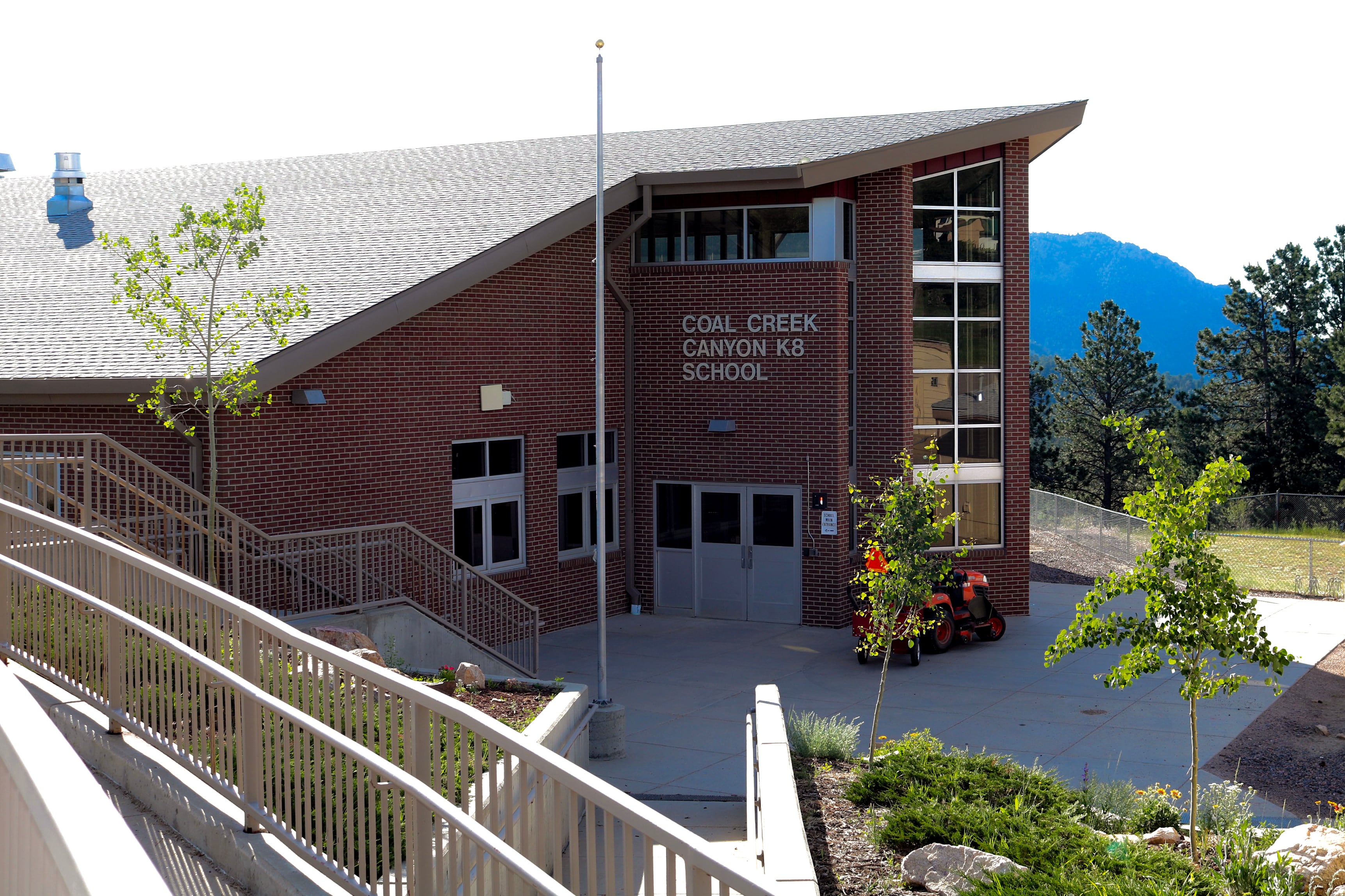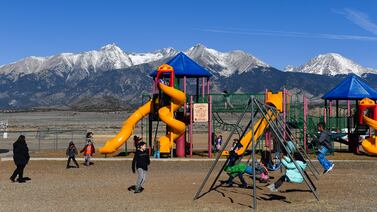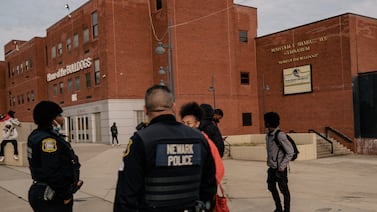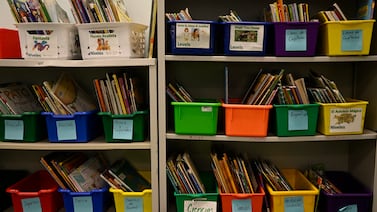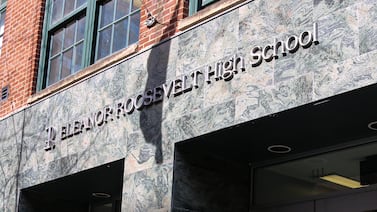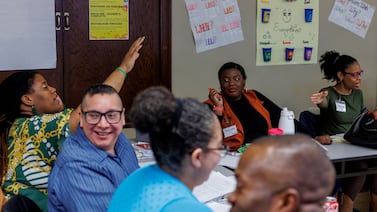Jeffco’s school board voted 4-1 Thursday night to close two district K-8 schools that together serve more than 500 students and have nearly 100 staff.
The two schools, Coal Creek Canyon K-8 and Arvada K-8, are the smallest of five K-8 schools in Jeffco Public Schools. Board members said that although closing schools is difficult, they worried that not closing schools would just kick the problem down the road instead of solving it.
“When you spread too thin then you leave an articulation area with just a little bit here and there, rather than really being able to concentrate those resources to the benefit of the whole area,” said board member Paula Reed, who voted in favor of closing the schools. “I believe in the end it serves the greatest good to the greatest number.”
Arvada K-8 will close at the end of this school year. When Coal Creek Canyon K-8 closes depends on whether the school board approves a charter replacement this January.
The closures, which the school district recommended in August, come amid a long-term decline in enrollment in Jeffco schools. Colorado funds school districts based on student count, and districts like Jeffco, in turn fund their schools based on enrollment as well, but small schools require extra money to maintain the basics. The district closed 16 elementary schools last year, and earlier this year approved a plan for a middle school to close at the end of this school year and merge with a high school.
Parents have publicly opposed closing Coal Creek and Arvada K-8, citing concerns about longer drives to school and the district’s budget strategy.
School board member Danielle Varda voted against the closures. Varda called the plan into question and asked for better solutions for these two schools.
“What I see is a need for a comprehensive plan for this area,” Varda said. “I lost sight of the urgency.”
The moves to close more schools at once are meant to prevent surprises, like when the district announced the closures of Allendale and Fitzmorris elementary schools in 2021 and 2022, respectively. Families had just months of notice before those closures.
The vote brings the total number of school closures in Jeffco — Colorado’s second-largest district — to 21 since 2021. Jeffco’s official enrollment last school year was 77,078 students, down from more than 86,000 in 2017-18. Additionally, the district notes that their buildings had space to serve 96,000 students, but were only serving 69,000 last year.
There are currently no plans to close any Jeffco high schools.
The resolution approved to close the schools also included an update on a plan to try to replace at least the elementary portion of Coal Creek Canyon K-8 with a charter school.
District leaders have said that although they believe it is not sustainable for them to continue operating that school, which is currently serving fewer than 100 students, they think a charter school may be more successful. They are also considering a charter school because the community in the canyon, and against the border with Boulder County, wouldn’t have many nearby Jeffco schools as options if Coal Canyon closes.
If one is approved, the district may allow the charter school to operate out of the Coal Creek Canyon building, at least to begin with. It’s rare in Colorado, outside of Denver, for a school district to share space with a charter school.
So far, the district has received letters of interest from three applicants: Jefferson Academy, Compass for Lifelong Discovery, and Sojournings Academy. All three of the applicants are proposing schools that would serve multiple grade levels beyond elementary school.
In an accelerated timeline, the board would be able to vote on whether to approve a charter application on Jan. 10 — just two days before the district’s choice enrollment window closes.
As a result, the district is suggesting that current families of Coal Creek Canyon K-8 use the choice enrollment form to select an option the district will create for a “Charter school serving Coal Creek Canyon - pending board of education authorization.” If the school board approves one of the charter applicants, then families can receive an offer from the approved school and can decide whether to accept it.
In that scenario, the district would change the attendance boundaries so that families in the canyon would otherwise be assigned to Three Creeks K-8, a 1,000 student school about 10 miles away.
If the school board doesn’t approve a charter school for Coal Canyon, then the district will delay the closure of the school’s elementary grades for one more school year. Middle school students would be educated through the district’s remote learning program during the next school year; they would have the option of being in the Coal Creek Canyon building with a staff member supervising the online learning.
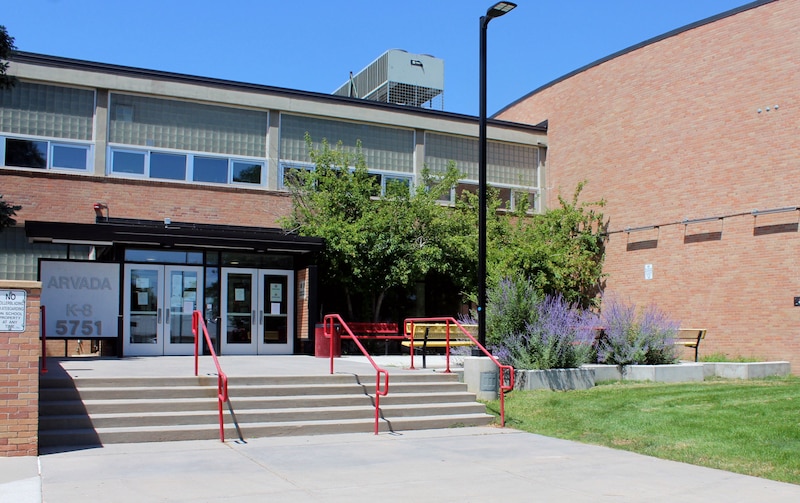
Lawmaker makes last-minute plea for community school
Parents have spoken out against the closure of the two schools in past meetings. There were also designated hearings this month that allowed for one hour of public comment about each of the two closed schools.
In past meetings, one mother talked about how the additional 10-mile drive to another school during winter weather conditions would require a lot more than 15 minutes.
Another parent questioned the board and district’s stance that it can’t afford to subsidize or give extra money to support Coal Creek Canyon K-8, while still spending much more on increasing salaries and other projects.
The district has countered that the challenge isn’t exclusively about the district’s budget, but the resources and opportunities that schools can or can’t offer when they’re too small.
While the small schools may have some benefits that appeal to parents, Superintendent Tracy Dorland said at a previous meeting that the fewer staff a school can afford, for example, the staff who do work at them have to wear multiple hats, such as when secretaries also serve as school nurses.
Families against the closures were in attendance at Thursday’s school board meeting, but did not sign up to speak again.
Colorado Sen. Rachel Zenzinger, a Democrat, did attend Thursday and asked the school board not to close Arvada K-8 and instead to consider turning it into a community school. That’s a school model that partners with nonprofit organizations to address external factors — such as poverty, hunger, or medical issues — that affect families and children’s ability to learn.
Zenzinger pointed out that about 15% of the students at Arvada K-8 are learning English as a new language, and that the school serves as an informal newcomer center for new immigrant students in the area.
Varda noted that although the district is committing to hire bilingual staff at the schools that will receive Arvada K-8 students, that staff could be used to strengthen the school instead of closing it.
This fall, Arvada K-8 learned that it finally earned a state rating that would be high enough for it to avoid state intervention. Board members said that while they would still have to close the school, they acknowledged it’s unfair that Arvada K-8 won’t be able to truly celebrate the achievement.
Yesenia Robles is a reporter for Chalkbeat Colorado covering K-12 school districts and multilingual education. Contact Yesenia at yrobles@chalkbeat.org.


